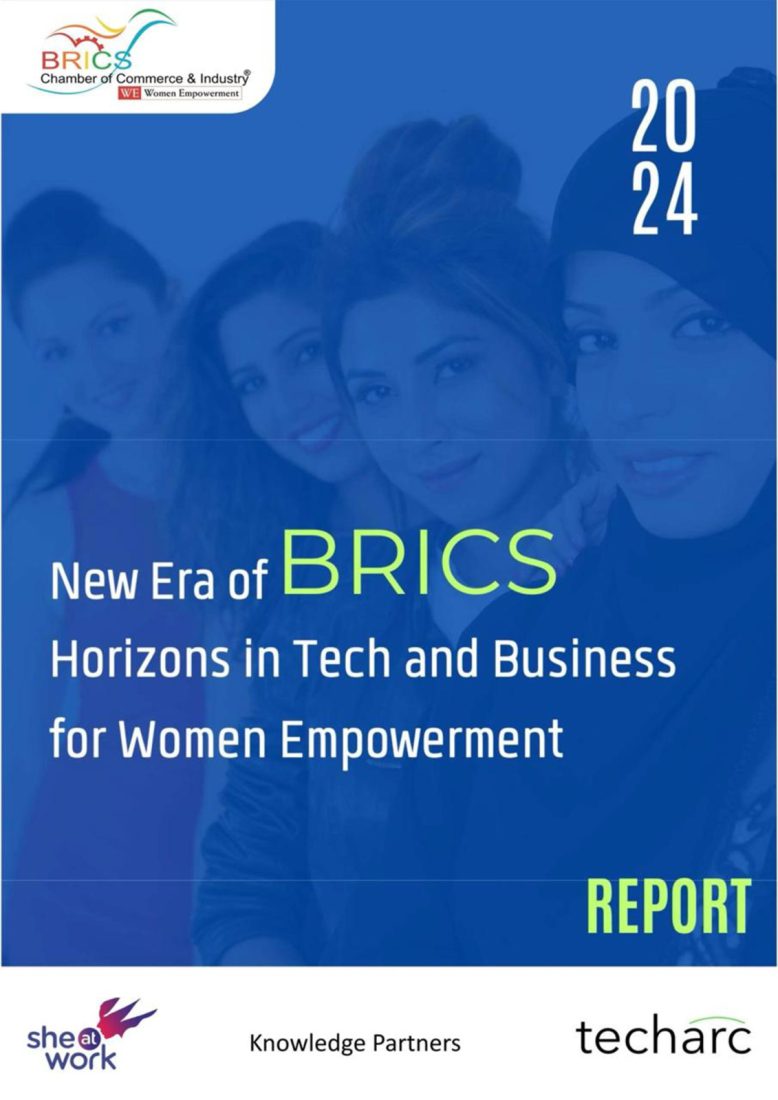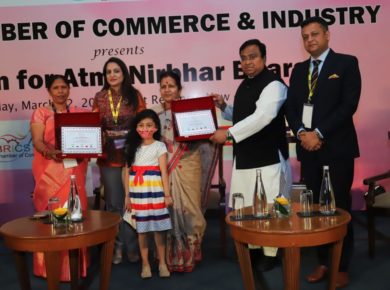New Delhi, 16th April | BRICS CCI WE, the Women Empowerment vertical of the BRICS Chamber of Commerce and Industry (BRICS CCI) has unveiled a special reporton the New Era of BRICS – Horizons in Tech and Business for Women Empowerment. The report sheds light on the technology and entrepreneurship landscape for women across the BRICS countries, emphasizing both progress and persistent challenges. With the expansion of BRICS in 2023, encompassing new members and representing a substantial portion of the global population and economy, the report underscores the significance of gender equality initiatives in the tech and business sectors. The report has been developed in association with sheatwork and techarc as knowledge partners and was unveiled by Amb. Sanjay Bhattacharyya (Retd.), Former BRICS Sherpa and Secretary to Govt. of India.
Key Highlights:
> Critical Role of Women Empowerment: The report underscores the critical role of women empowerment in achieving Sustainable Development Goals (SDGs) and fostering economic and social growth.
> BRICS Membership Expansion: BRICS expanded in 2023, comprising over 47% of the world’s population and 36% of the GDP, illustrating its growing diversity and influence.
> Commitment to Gender Equality: BRICS countries demonstrate commitment to gender equality initiatives, recognizing the importance of women’s technological empowerment and entrepreneurship. Digital inclusivity is highlighted as a potential gamechanger.
According to Ruby Sinha, President, BRICS CCI WE and Founder, sheatwork.com, “As we celebrate the strides made in technology and entrepreneurship by women across BRICS nations, this report serves as both a testament to progress and a call to action. With the BRICS coalition encompassing new members and representing a significant portion of the global population and economy, it is imperative that we prioritize gender equality initiatives to create an inclusive and supportive environment for women in business. Let us harness the power of innovation and entrepreneurship to pave the way for a brighter, more equitable future for women worldwide.”
Ms. Ankita Sachdeva, Jt. Director, BRICS CCI said, “As we reflect on the expansion of BRICS in 2024, it is clear that gender equality initiatives in the tech and business sectors are more crucial than ever. We must continue to advocate for policies and programs that support women’s access to resources, opportunities, and mentorship.’’
Dr. Shahana Qutab, Director and Co-founder, Techarc said, “The BRICS CCI WE 2024 Report sheds light on the opportunities & challenges faced by women entrepreneurs, emphasizing the need for collaborative efforts to create a more inclusive and supportive environment for women in business.”
Country-specific Insights:
> Brazil: The entrepreneurship universe in Brazil has around 30% businesses led or created by women. Such enterprises are smaller having limited access to financing, with only 9.8% of tech startups founded by women.
> Russia: Women’s participation in tech roles is notable, with 40% of researchers being women. However, venture capital funding for female-founded startups remains low.
> India: Indian women contribute significantly to STEM fields, but face challenges in accessing leadership roles and venture capital funding, receiving only 0.3% of startup funding.
> China: Female science workers constitute approximately 45% of the country’s total science workforce, playing a pivotal role in groundbreaking endeavors including manned spaceflight, space exploration, medicine, computer science, and various other fields.
> South Africa: Women contribute significantly to leadership positions in South Africa’s tech giants, comprising 28% of leadership roles.
> Iran: Over the past three decades, women’s participation in the Iranian workforce has shown a notable increase, rising from 10.5% in 1990 to 16.8% in 2020 according to the World Bank. While still lower than Western countries, this upward trend demonstrates significant improvement in Iran’s gender participation in the workforce, indicating positive strides towards greater inclusivity and economic empowerment for women.
> Egypt: The country demonstrates significant strides in promoting gender diversity in STEM education, with 30-35% of females actively participating in these critical fields. This statistic underscores Egypt’s commitment to fostering inclusivity and empowering women in traditionally male-dominated domains. Such progress paves the way for enhanced opportunities and empowerment for women in Egypt, contributing to broader societal and economic advancement.
> Ethiopia: Ethiopian women continue to face substantial under-representation in the technology sector, including limited presence in women-led businesses and technology-oriented Small and Medium Enterprises (SMEs). Despite their potential, opportunities for entrepreneurship among women in Ethiopia significantly lag behind those available to men. Moreover, women encounter numerous barriers in their entrepreneurial pursuits, highlighting the urgent need for targeted interventions to address these challenges and promote gender equality in the tech and business sectors.
> Saudi Arabia: 28% participation of women in the tech sector, reflect significant strides in gender inclusivity and empowerment in the country, with notable progress in digital entrepreneurship.
> UAE: The country is showcasing its commitment to empowering women by achieving a noteworthy milestone of 30% representation of women in public sector leadership roles. This achievement underscores the UAE’s dedication to fostering diverse and inclusive leadership environments, ensuring women’s voices are heard and valued in decision-making processes within the public sector.
The report emphasizes the need for collective efforts to address persistent gender gaps and barriers, advocating for initiatives such as targeted support for women entrepreneurs, fostering diversity and inclusivity, and promoting STEM education among females.
The BRICS 2024 report underscores the importance of women’s empowerment in technology and entrepreneurship, highlighting both achievements and areas for improvement. Through collaborative efforts and targeted initiatives, BRICS countries aim to advance gender equality and foster inclusive economic growth. You can access the report at: https://bricsmainstream.com/reports
About BRICS-CCI WE:
The BRICS Chamber of Commerce and Industry (BRICS CCI) is a parent organization that promotes commerce and industry in the BRICS and other friendly nations. The Chamber, founded in 2012 with the efforts of eminent professionals and entrepreneurs, is a not-for-profit and non-governmental organization. BRICS CCI is a registered body under Societies Registration ‘Act 1860, Government of India and empanelled with NITI Aayog (highest policy-making body of Govt of India) and recognized by United Nations. The Chamber organises trade fairs, exhibitions, seminars, symposiums, lectures, and business campaigns from time to time to intensify the institutional links and business relations between BRICS countries and other friendly nations. The Women Vertical of BRICS CCI has been created with prime focus on women empowerment initiatives and policies across geographies. The objective of the women’s wing is to create an enabling support system for women entrepreneurs and professionals across geographies. Website: https://bricscci.com/women
About SheAtWork
Sheatwork.com, a one-stop knowledge hub for women entrepreneurs aims to be a mentor and guide for women from both urban and rural areas- to help them make their entrepreneurial dream a reality. It is a storehouse of information to increase awareness about all relevant areas of entrepreneurship. Website: www.sheatwork.com, Twitter: @sheatwork_com
About Techarc
Techarc is a market analyst and consulting firm offering knowledge and advisory services to enterprises and startups. Techarc also works closely with leading industry think tanks and trade associations for advocacy and thought leadership programmes. Founded in 2018, Techarc serves some of the leading global enterprises with market insights and intelligence leveraging latest technologies like AI and ML blended with legacy market research practices.










